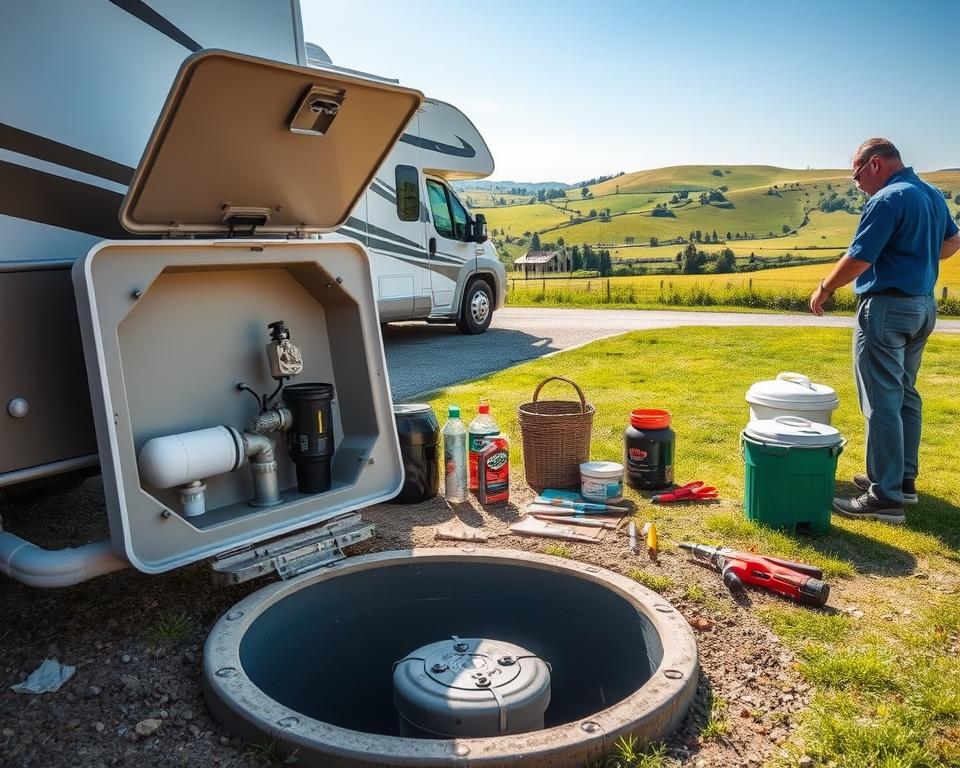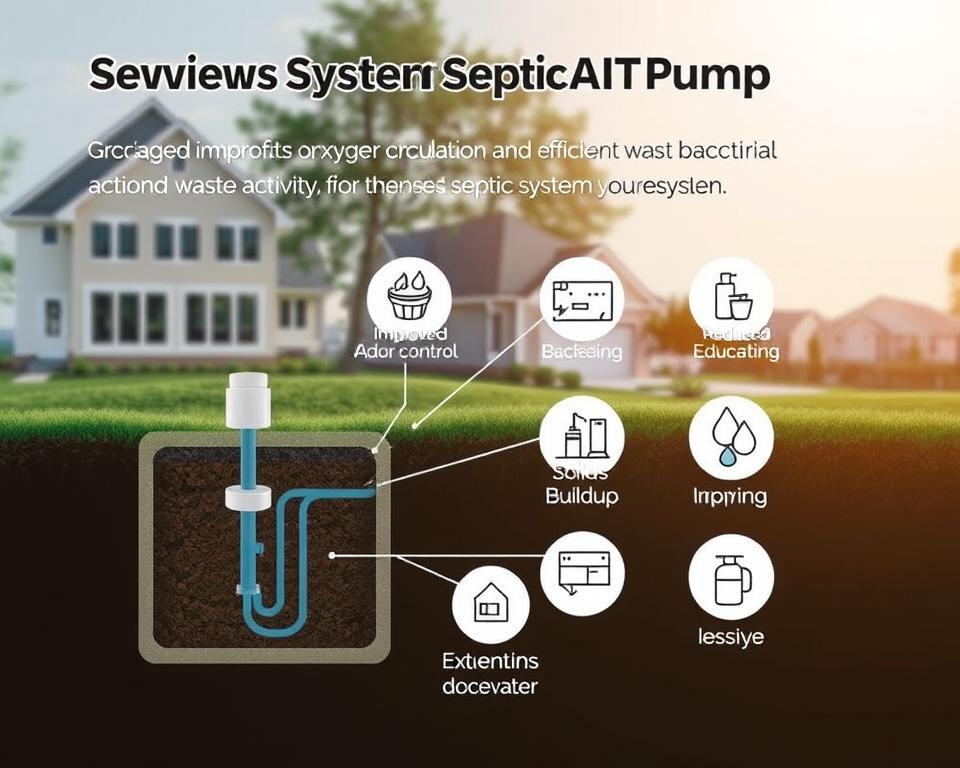Common Failure Points of Merced RV Grey Water Pumps
Your Complete Resource for Mobile RV Waste Receptacle Pumping Services
A question to ponder: why are RV enthusiasts increasingly turning towards mobile RV holding container servicing over traditional methods? This guide aims to demystify the growing trend. It highlights the convenience of in-situ wastewater removal methods for RVs. Forget about the endless waiting lines and the stressful search for dump stations. Instead, let’s focus on the streamlined approach of on-site RV black water holding unit servicing. This is vital knowledge whether you’re deeply experienced in RV travels or just embarking on your journey. Understanding RV septic tank pumping cost is crucial for keeping your RV clean and functional.
Understanding Mobile RV Waste Holding Unit Servicing
A crucial service for RV enthusiasts is mobile RV waste receptacle emptying. It allows them to empty their wastewater containers without heading to a dump station. This service features technicians with specialized trucks who visit your location directly. It’s invaluable for camping or boondocking in secluded areas without access to standard facilities.
With a focus on efficiency, this service aims to minimize any impact on your time outdoors. Technicians manage the entire process, from hose connection to safe waste removal. For those prioritizing ease, this service ensures their RV’s wastewater system is maintained without hassle.
The Process of Mobile RV Holding Container Servicing
Efficiency and ease are the goals of the mobile RV waste holding unit servicing process for RV lovers. Upon booking, a technician comes with a specialized truck, designed to efficiently remove waste. This vehicle is equipped with advanced vacuum gear for RV waste systems, ensuring complete removal of sewage from your containers.
As the initial step, the technician will securely attach hoses to your RV’s waste disposal point. Doing so guarantees effective waste suction. Once connections are secured, the vacuum is turned on, thoroughly cleaning the containers. This is a vital step to keep your RV’s plumbing in top shape and make sure your travels remain enjoyable.
The technician may opt to cleanse the containers with water after the pumping process. This process removes lingering waste and odors, preparing your RV for more adventures. This service is crucial for those passionate about RVing, as it allows them to explore without worrying about waste management.
What You Gain from Mobile RV Waste Receptacle Emptying Services
RV owners can enjoy considerable benefits from mobile RV waste receptacle emptying services. One key benefit is convenience. Users can have their waste containers emptied where they are parked. This eliminates the need to find disposal stations, saving time and reducing hassle.
These services prioritize environmental responsibility. They follow local laws, ensuring waste disposal is safe and compliant. This commitment safeguards natural resources and lessens RV waste’s impact on communities.
Mobile RV waste holding unit servicing allows travelers to concentrate on the pleasures of their journey. The reliability and efficiency of these services improve the travel experience. They make it more enjoyable and stress-free.

When to Use Mobile RV Holding Container Servicing
For an RV system to function properly, utilizing mobile RV waste receptacle emptying is crucial. It’s important to know when it’s time for service to dodge unsavory conditions and ensure efficient RV waste water handling. Signs you need immediate pumping include bad smells from the RV, slow draining sinks or showers, and containers appearing full.
Depending on the number of users and the amount of water used, the need for RV gray water waste receptacle emptying will vary. Usually, maintenance is necessary from a few days up to a week, depending on these factors. By monitoring these signs, RV owners can prevent overflows and keep their waste management system in good condition.
Tips for Choosing a Mobile RV Waste Holding Unit Servicing Provider
It’s very important for RV owners to choose the right mobile RV waste holding unit servicing provider. It requires careful research into local services. This ensures reliability and adherence to safety standards. It’s critical to select companies with the necessary licenses and insurance for protection against accidents.
Customer reviews can provide valuable insights into the quality of service you can anticipate. It offers a glimpse into other people’s experiences. Focus on comments about the RV black water holding unit service and the company’s professionalism.
It’s crucial to compare what different services offer. They might have unique features that impact your decision. While comparing, look beyond just the price. Quality service should be your top priority. Also, gauge the company’s reputation among RV lovers. Those with positive reputations have likely earned the trust of the community.
| What to Look For | Key Considerations |
|---|---|
| Licenses and Insurance | Make sure they have valid licenses showing they follow the rules and insurance to protect you |
| Customer Reviews | See what other customers have rated them and what they have said |
| Service Offerings | Look at the different features and details of their RV black water waste receptacle emptying service |
| Cost | Ask for quotes but also make sure the service is good |
| Reputation | Find out what people in the RV community think of the company |
These guidelines will help RV owners choose a mobile RV wastewater container servicing company that suits their requirements.
Your Guide to Your Mobile RV Wastewater Container Servicing Appointment
Clear communication is essential when you schedule a mobile RV waste receptacle emptying service. Inform the service provider of your RV’s location and details about your container like size and status. This helps the technician prepare and ensures a smooth service.
Following this, the technician will begin a systematic process of emptying your waste, making sure safety and efficiency are top priorities. They use specialized equipment to safely extract and transport waste. The waste is promptly taken to approved RV sewage disposal facilities, ensuring environmental and personal health safety.
You might find it helpful to choose extra services such as container cleaning and deodorization. These services improve your RV’s sanitation, making the inside of your vehicle cleaner and more pleasant.
Factors Affecting the Price of Mobile RV Waste Holding Unit Servicing
Mobile RV waste receptacle emptying services can vary a lot in price. A key factor is the container size needing service. Larger containers mean higher fees because they demand more resources and time for waste removal.
The location significantly impacts cost. Service fees differ between urban and rural areas. The travel expenses to reach an RV also influence the price.
The cost will increase if you opt for additional services such as a thorough cleaning or maintenance tips. To get a fair deal, compare quotes and fully understand what each package includes.
Options Besides Mobile RV Waste Receptacle Emptying
RV enthusiasts have several waste management options beyond mobile septic pumping. Each alternative has benefits and drawbacks. Knowing these helps RV owners make better decisions.
A common method is to use the dump stations that are available at campgrounds. They offer a reliable way for RV waste water removal. Though planning is essential, these facilities ensure safe waste disposal.
Consider using portable waste containers as another option. They let RV users temporarily store and transport waste to designated areas. This approach provides flexibility, yet managing an extra container may be inconvenient.
If you’re environmentally conscious, using composting toilets is a good choice. They turn human waste into compost by natural processes. While setup and maintenance require more effort, these toilets are beneficial for the environment-aware RV community.
| Alternative | Advantages | Disadvantages |
|---|---|---|
| Dumping Stations | Easy to get to; safe way to get rid of waste | You can only use them where they are; you might have to wait |
| Portable Waste Containers | Flexible storage; reduces immediate disposal needs | Additional handling required; maintenance |
| Composting Toilets | Environmentally friendly; minimal waste | More complex setup; requires ongoing management |
It’s important for RV owners to consider their needs when choosing a waste management method. Each option has its own set of advantages.
Effective RV Waste Management Strategies
For an efficient RV waste system, it’s important to stick to key best practices. It’s vital to regularly check the waste levels in both black and gray water containers. This avoids overflows and ensures smooth operation at sewage disposal services.
For your RV gray water waste receptacle to work best, effective flushing methods are crucial. Flushing with enough water helps break down waste and prevents residues from sticking to the container walls. Regular practice minimizes buildup and combats foul smells.
Using the right chemicals is crucial for waste breakdown. Opt for products specifically made for RVs to keep the container healthy and better the waste management system. Selecting proper chemicals boosts your RV gray water holding unit’s effectiveness, ensuring thorough removal at sewage disposal services.
Keep these tips in mind for effective RV waste management:
- Schedule routine checks on your waste levels and system functionality.
- Make sure you use enough water when you flush to completely empty the toilet.
- Choose chemicals that break down naturally and are good for the environment.
- To avoid contamination, dedicate one hose for waste removal only.
- Establish a regular service routine with a reliable RV sewage disposal service.
Misunderstandings About Mobile RV Waste Holding Unit Servicing
Many misconceptions about mobile RV holding container servicing can influence RV owners’ decisions negatively. A common misconception is that these services are solely for emergencies. Some think using an RV black water holding unit service is needed only during overflow or blockages. Yet, regular maintenance via mobile RV holding container servicing can avert these crises.
Many people mistakenly believe that mobile RV waste receptacle emptying services are more expensive than traditional methods. Though there may be a slight cost difference, the benefits in convenience and time often outweigh this. Avoiding the trip to a dump station not only saves time but also reduces fuel expenses. With competitive pricing on the rise, mobile RV holding container servicing is becoming an affordable choice.
RV owners often worry about how reliable mobile services are. There’s a fear that these services might not possess the required professionalism or equipment. However, reputable mobile RV holding container servicing comes with the necessary tools and trained professionals to ensure efficient and sanitary service.
What All in Sanitation Offers
RV owners seeking efficient mobile RV wastewater container servicing will find All in Sanitation to be a great option. They prioritize safety and quality, ensuring a smooth and timely waste water removal process. This allows travelers to enjoy their journeys without the burden of waste management worries.
Their professional waste handling demonstrates their commitment to environmentally friendly practices. Their team’s expertise safeguards the environment while maintaining your RV’s sanitation system. This not only keeps your vehicle in top condition but also guarantees worry-free road adventures.
The flexible scheduling options from All in Sanitation cater to the needs of RV enthusiasts, providing service wherever they may be. Whether you’re parked or at home, they’re ready to assist, allowing you to concentrate on creating lasting memories. Their proficiency in waste management removes the hassle from your travels.
Their focus on customer satisfaction ensures a hassle-free service from the beginning to the end. RV travelers can rest easy, knowing their sanitation needs are in competent hands. This assurance transforms their travel experiences into enjoyable journeys.
In Summary
Mobile RV waste holding unit servicing plays a crucial role in ensuring a clean and enjoyable travel experience. Understanding the importance of sanitation maintenance empowers RV owners in decision-making. A reliable RV sewage disposal service improves cleanliness and comfort while traveling.
By knowing when to use mobile RV waste receptacle emptying services, you can avoid unpleasant situations and have a worry-free adventure. Staying proactive in waste disposal allows you to concentrate on making lasting memories with loved ones. Remember these insights to fully enjoy RV travel.


